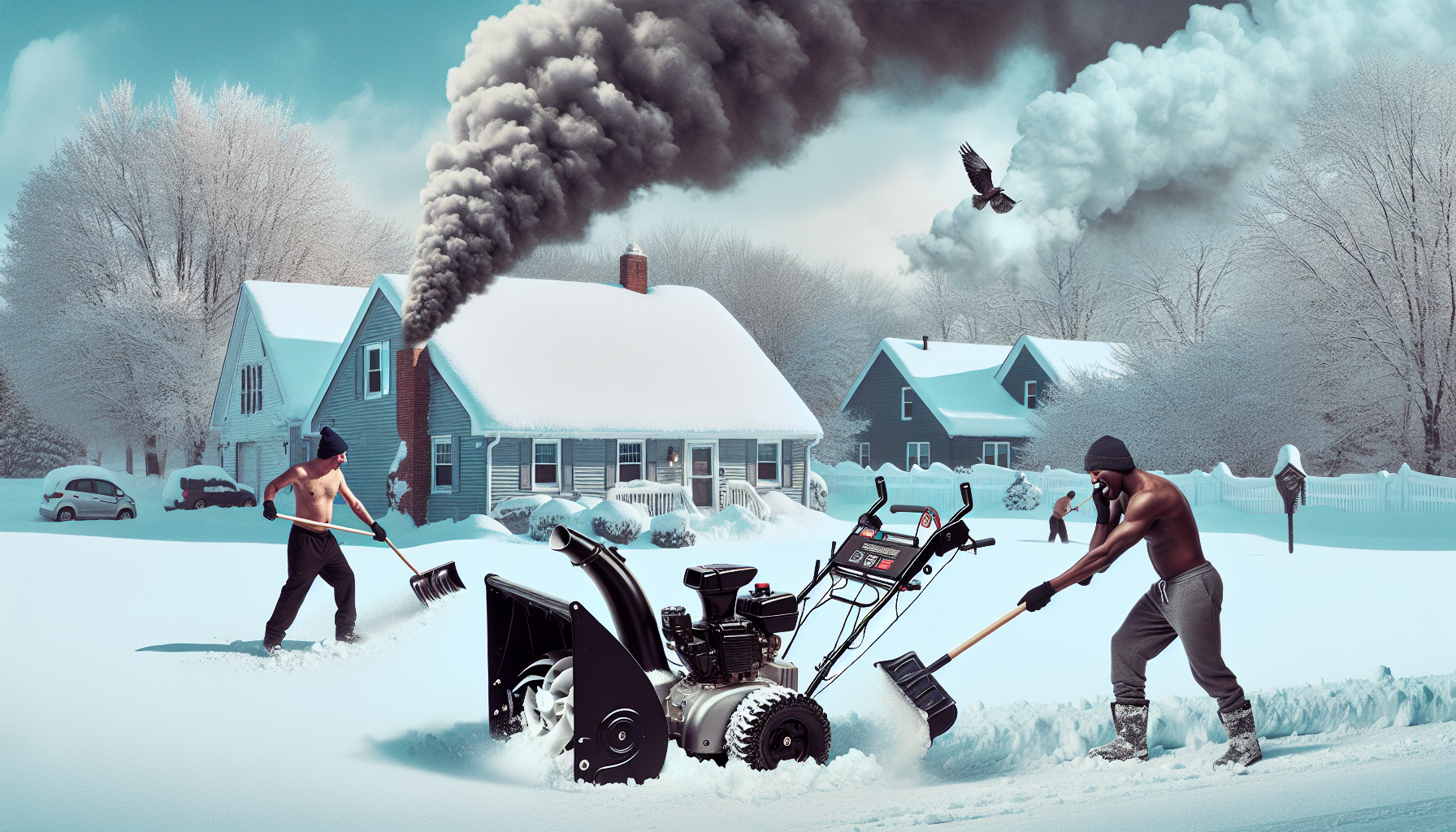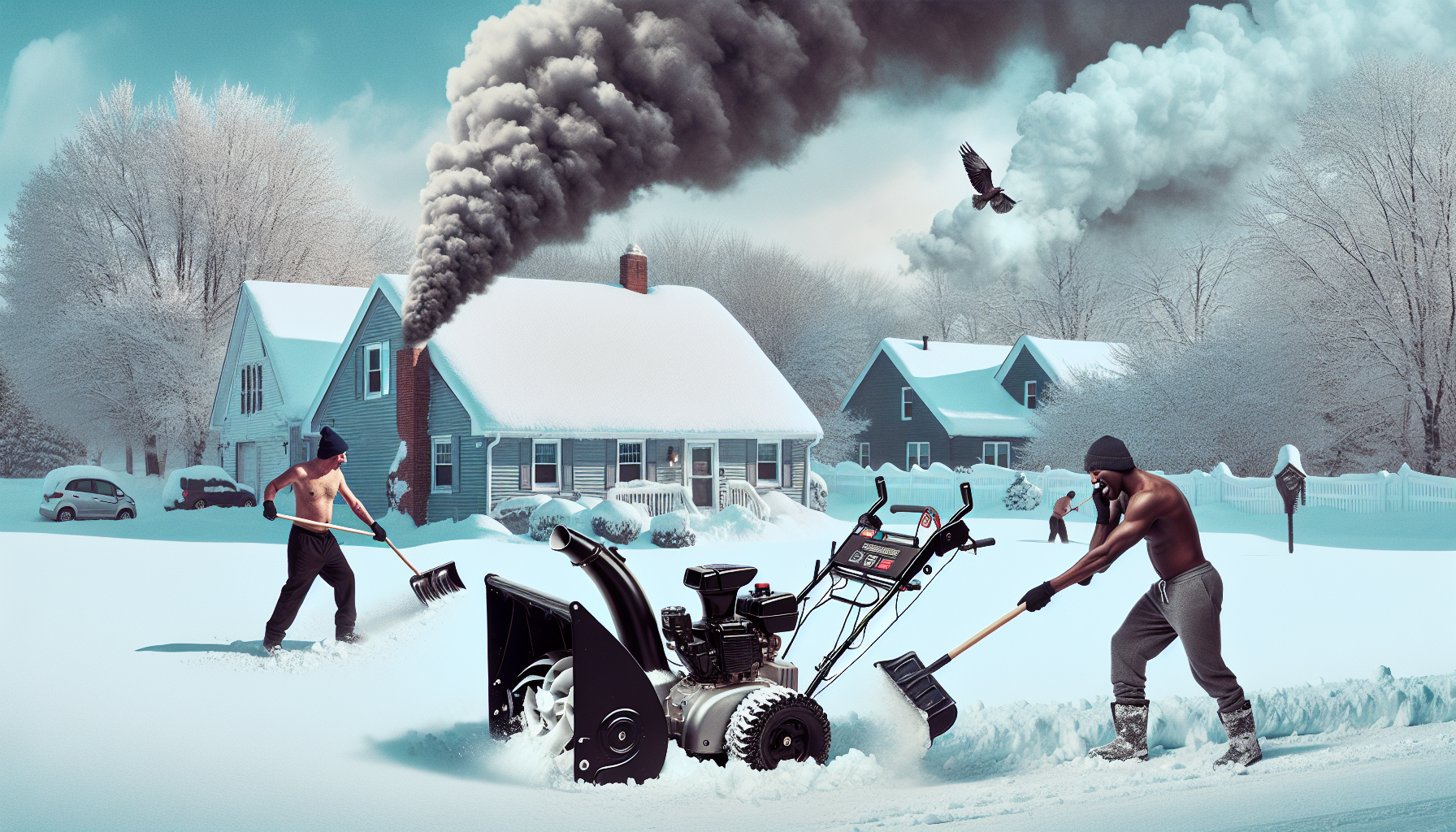Winter is a season filled with breathtaking landscapes and cozy moments by the fire, but it also brings with it the challenge of clearing snow from driveways and sidewalks. While snowblowers may seem like a convenient solution to this wintry dilemma, have you ever wondered about their impact on the environment? In this article, we will explore why snowblowers are considered detrimental to our surroundings, shedding light on the hidden consequences of this popular winter tool.

Air Pollution
Snowblowers contribute to air pollution in several ways. The emission of greenhouse gases, such as carbon dioxide (CO2), is a major concern. Snowblowers typically run on fossil fuels like gasoline, which release significant amounts of CO2 into the atmosphere when burned. This contributes to the greenhouse effect and global warming, posing a threat to the environment.
Another aspect of air pollution caused by snowblowers is the release of particulate matter. When snow is blown away by the machine, it creates a cloud of fine particles in the air. These particles can contain harmful substances like soot, which can have detrimental effects on both human health and the environment. Inhaling these particles can lead to respiratory problems and aggravate existing conditions such as asthma.
Additionally, the use of snowblowers contributes to the formation of smog. The combination of vehicle emissions, including those from snowblowers, and other industrial processes can result in the production of ground-level ozone. This leads to the formation of smog, which can cause numerous respiratory issues for humans and harm plant life. It is important to consider the impact of snowblowers on air quality and explore alternative methods of snow removal that reduce air pollution.
Noise Pollution
Snowblowers are notorious for creating significant noise pollution, which can have negative consequences for both wildlife and human health. The loud, constant noise produced by these machines can disturb and disrupt the natural behavior of wildlife in the surrounding areas. Animals such as birds, who rely on quietness to communicate and locate their prey, may be disturbed by the noise, causing them unnecessary stress and potentially affecting their ability to find food and breed.
In addition to wildlife disturbance, noise pollution from snowblowers can have adverse effects on human health. Prolonged exposure to high levels of noise can lead to hearing damage, stress, and sleep disorders. People living in close proximity to snowblower use may find it difficult to concentrate, relax, or get a good night’s sleep. Moreover, the disruptive noise can detract from the peaceful surroundings of a neighborhood, diminishing the overall quality of life for residents.
Fuel Consumption
The heavy reliance on fossil fuels for snowblower operation is a significant concern in terms of fuel consumption and associated environmental impact. Gasoline-powered snowblowers consume substantial amounts of fossil fuels, further exacerbating the issues surrounding climate change and global warming. The burning of these fuels releases carbon dioxide and other greenhouse gases into the atmosphere, contributing to the overall carbon footprint.
There is a pressing need to transition towards more sustainable and eco-friendly alternatives in order to reduce fuel consumption and mitigate the environmental impact of snowblowers. Exploring electric or battery-powered snowblowers can be a viable solution to minimize dependence on fossil fuels and decrease the carbon footprint associated with snow removal.
Water Pollution
Snowblowers can indirectly contribute to water pollution through chemical runoff. Many areas that require snow removal are treated with deicing agents that contain chemicals such as salt or calcium chloride. When snow is blown away by the machine, these chemicals can end up in nearby water bodies, contaminating natural aquatic systems.
Chemical runoff into water bodies can have detrimental effects on aquatic life, including fish, amphibians, and plants that rely on the water for survival. It can disrupt the natural balance of the ecosystem and lead to water pollution, compromising the quality of drinking water sources and harming the biodiversity of aquatic habitats.
Hazardous Material Disposal
Improper disposal of harmful substances is a significant environmental concern associated with snowblowers. Oil and gasoline spills can occur during refueling or as a result of maintenance issues. If these spills are not handled properly, they can contaminate soil and nearby water bodies, posing a risk to both the environment and human health.
Furthermore, the disposal of hazardous waste from snowblowers, such as used engine oil or discarded parts, needs to be done responsibly. The inappropriate disposal of these materials can have long-lasting effects on the environment, including soil contamination and increased susceptibility to groundwater contamination.
Negative Effect on Soil
Snowblower use can have a negative impact on the health and quality of soil. Frequently passing over the same areas with heavy machinery can lead to soil compaction, making it more difficult for plants to receive adequate water, nutrients, and oxygen. Compacted soil can limit root growth, leading to stunted plants and decreased biodiversity.
Another issue related to soil is the potential contamination of chemicals used in snowblower operations. If deicing agents or other substances are blown onto the soil when removing snow, they can seep into the ground and negatively affect soil health. These contaminants can disrupt the soil’s ability to support plant growth and can further contribute to water pollution when they leach into nearby water bodies.
Disruption to Natural Processes
The use of snowblowers can disrupt natural processes in various ways, impacting both the environment and wildlife. One significant concern is the alteration of snow and ice melting patterns. Snowblowers remove snow from designated areas, altering the natural melting process. This can affect local hydrological systems and potentially lead to changes in water availability for wildlife and plants.
Additionally, the noise and disturbance caused by snowblowers can disrupt the natural habits and behaviors of wildlife. Animals may be forced to flee from the noise, abandon their nests or hibernating spots, or alter their feeding patterns. Disruption to these natural processes can have cascading effects on ecosystems, potentially leading to population declines or imbalances in predator-prey relationships.
Waste Generation
Snowblowers contribute to waste generation in several ways. Excessive noise pollution caused by these machines can result in complaints and potential disputes among neighbors. This may result in increased waste generation through legal actions, complaints to local authorities, or the creation of unnecessary tension in communities.
In addition to noise-related waste, snowblower use can generate hazardous waste. Maintenance and repair activities may generate waste materials such as used engine oil, filters, or worn-out parts. The proper disposal of these hazardous materials is crucial to avoid further environmental contamination and potential health risks.
Higher Energy Consumption
The operation of snowblowers often requires a significant amount of electricity, especially in larger models or when using electric snowblowers. This higher energy consumption places an increased strain on power grids, which may already be under pressure due to winter weather conditions and increased demand for electricity.
The increased energy demand for snowblower operation can contribute to greenhouse gas emissions indirectly if the electricity is generated from non-renewable sources. The reliance on fossil fuels for electricity production further exacerbates the carbon footprint associated with snow removal.
Limited Environmental Benefits
Snowblowers, despite being designed for efficient snow removal, may have limited environmental benefits compared to manual snow removal methods. While they can quickly remove snow from large areas, they lack the ability to target specific areas effectively. This can result in the removal of more snow than necessary and the potential damage to vegetation or other elements of the landscape.
Furthermore, snowblowers may not be as efficient as manual methods in certain situations. In light snowfall events or for smaller areas, manual snow removal using shovels or snow blowers can often be more practical and less energy-intensive. Assessing the environmental benefits and drawbacks of using snowblowers versus manual methods is important in order to make informed decisions regarding snow removal practices.


